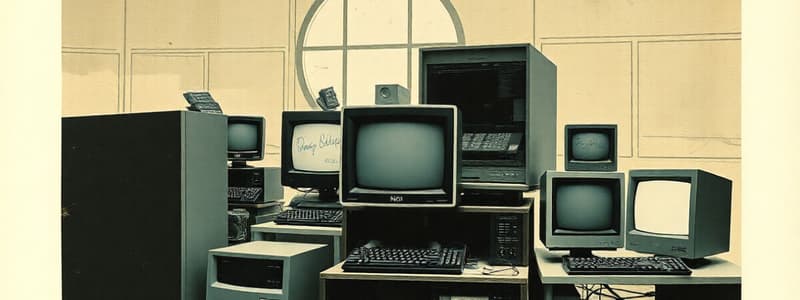Podcast
Questions and Answers
What defines a supercomputer?
What defines a supercomputer?
- A computer designed specifically for general use by one person.
- A high-performance computer used for complex calculations. (correct)
- A cost-effective and portable computer for personal use.
- A type of mainframe used for data processing at hospitals.
What is the primary purpose of a server in a network?
What is the primary purpose of a server in a network?
- To process large amounts of data.
- To support thousands of users simultaneously.
- To serve as a cost-effective alternative to mainframes.
- To provide web applications and data storage. (correct)
What distinguishes a workstation from a desktop computer?
What distinguishes a workstation from a desktop computer?
- Workstations can only operate on mobile technology.
- Workstations are less powerful and designed for general use.
- Workstations are not designed for graphic-intensive tasks.
- Workstations have specialized capabilities for specific tasks. (correct)
Which computer type emerged due to microchip technology in the 1970s?
Which computer type emerged due to microchip technology in the 1970s?
What are convertible or hybrid computers known for?
What are convertible or hybrid computers known for?
What is a key feature of wearable computers?
What is a key feature of wearable computers?
What distinguishes phablets from smartphones and tablets?
What distinguishes phablets from smartphones and tablets?
Which device category declined due to difficulties in syncing data, software incompatibility, and competition from smartphones?
Which device category declined due to difficulties in syncing data, software incompatibility, and competition from smartphones?
Which of the following is a feature of QR Code readers compared to traditional barcode readers?
Which of the following is a feature of QR Code readers compared to traditional barcode readers?
What role do embedded computers play in modern technology?
What role do embedded computers play in modern technology?
Flashcards
Personal Computers
Personal Computers
These computers are designed for general use by a single person. They were initially known as microcomputers and include desktop and laptop PCs.
Mainframe Computers
Mainframe Computers
These powerful computers process vast amounts of data simultaneously, supporting thousands of users. They are used by large organizations like banks and airlines.
Servers
Servers
These computers are the largest and most powerful in a network. They manage resources, store data, process queries, and provide services to other computers on the network.
Workstations
Workstations
Signup and view all the flashcards
FLOPS
FLOPS
Signup and view all the flashcards
Smartphones
Smartphones
Signup and view all the flashcards
Wearable Computers
Wearable Computers
Signup and view all the flashcards
Embedded Computers
Embedded Computers
Signup and view all the flashcards
Card Readers
Card Readers
Signup and view all the flashcards
QR Code Readers
QR Code Readers
Signup and view all the flashcards
Study Notes
Computer Types
- Computers are any devices with microprocessors. Various terms describe them based on size, performance, and capabilities.
Large Computers
- Supercomputers: Extremely high-performance, expensive computers used for complex calculations like weather forecasting and nuclear research. Speed is measured in FLOPS (Floating Point Operations Per Second).
- Mainframe Computers: High-speed, expensive systems supporting many users simultaneously. Used by large organizations (banks, airlines, hospitals) for massive data processing. Feature multi-programming and multi-OS functionality, and processing speed is measured in nano/picoseconds. Replaced by minicomputers and later microcomputers.
- Minicomputers: Introduced in the 1960s as a more affordable alternative to mainframes.
- Microcomputers (Personal Computers): Emerged in the 1970s, affordable, reliable, and compact.
- Servers: The most powerful computers in a network. They provide services, manage resources, and process queries. Often used for web applications and data storage in contrast to mainframes that process massive amounts of data.
Smaller Computers
- Personal Computers (PCs): Designed for personal use. Originally known as microcomputers. Include desktops and laptops.
- Desktop Computers: Non-portable PCs with more power, storage, and versatility. Can have separate screens and keyboards.
- Workstations: Desktop computers with powerful processors for specialized tasks like 3D graphics or game development.
- Laptops and Notebooks: Portable computers with integrated components. Lighter than desktops, usable during power cuts. Generally have less upgradability.
- Netbooks: Ultra-portable, smaller, and less expensive than traditional laptops. Less powerful internal components.
- Convertible or Hybrid Computers: Ultralight notebooks with rotating/detachable touchscreens. Limited performance as notebooks, user-friendly as tablets.
Mobile Technology
- Mobile Phones: Small computers that evolved from basic phones. Initial phones lacked operating systems and internet access.
- Personal Digital Assistants (PDAs): Handheld mobile computers with computing, phone, internet, and recognition features. Decreased in popularity as smartphone features improved and easier integration to cloud storage.
- Smartbooks: Devices combining smartphone and netbook features. Replaced largely by tablets.
- Smartphones: Mobile phones with email, web services, music players, cameras, GPS, and touchscreens.
- Tablets: Wireless, portable personal computers with touch screen interfaces. Larger than smartphones, smaller than notebooks.
- Phablets: Hybrid devices combining smartphone and tablet features for portability and performance. Rough size guidelines: Smartphones<5.5", Phablets 5.5"-7", and tablets >7".
Wearable, Handheld, and Embedded Computers
- Wearable Computers: Computer-powered devices worn by users (e.g., smartwatches). Key features are constant interaction and multitasking.
- Card Readers: Devices that read plastic cards with barcodes, magnetic strips, or chips. Used in ATMs.
- Barcode Readers: Devices scanning barcodes. Used for data capture in supermarkets.
- QR Code Readers: Devices reading QR codes for data transfer. Can hold more information than barcodes.
- Radio Frequency Identification (RFID) Systems: Use radio frequencies for tracking and identifying tags with various sizes and applications such as anti-theft tags and credit card chips.
- Embedded Computers: Computers integrated into machinery for specific tasks. Examples are DVD players, thermostats, washing machines, and car navigators.
Studying That Suits You
Use AI to generate personalized quizzes and flashcards to suit your learning preferences.




